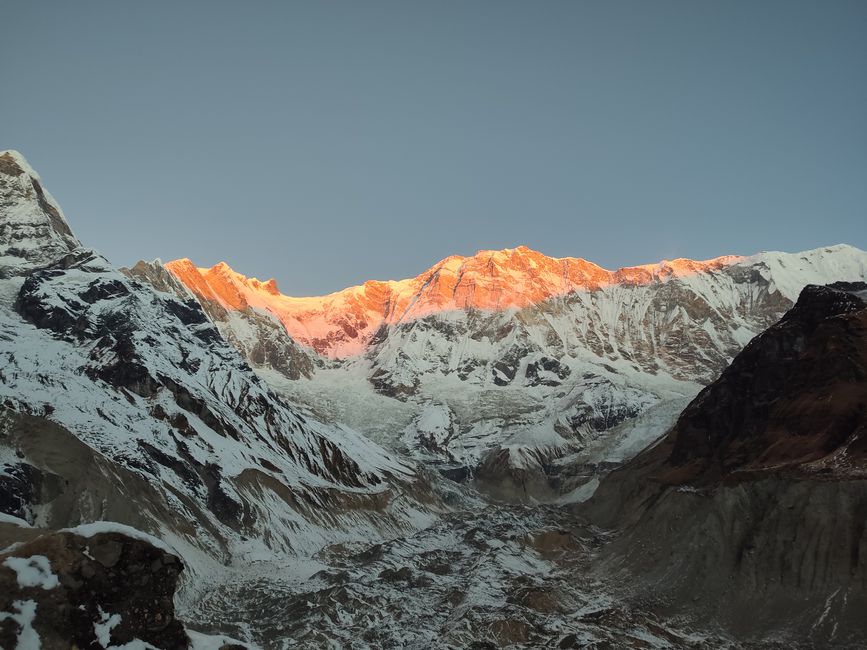Working on a tea plantation - India
Oñemoherakuãva: 13.10.2023
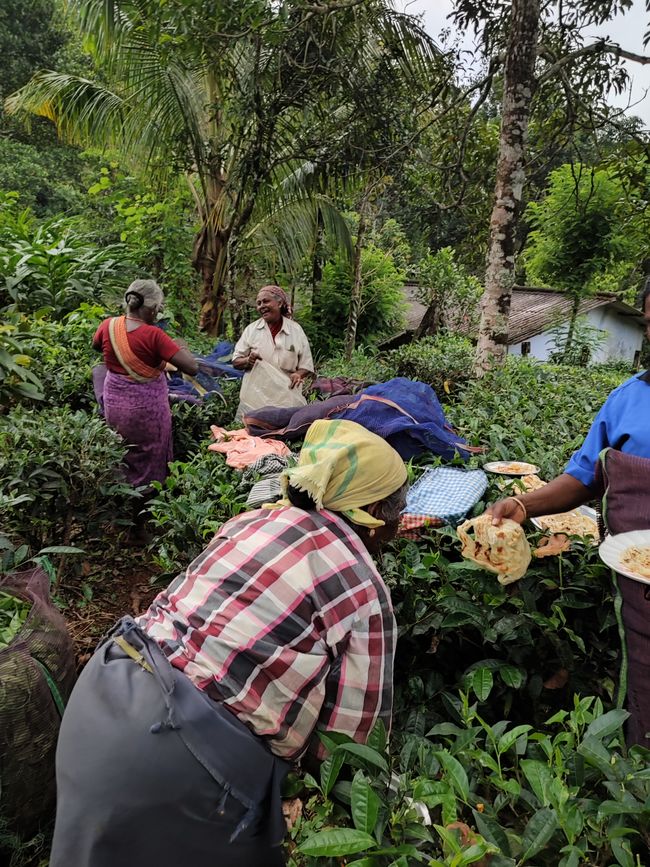
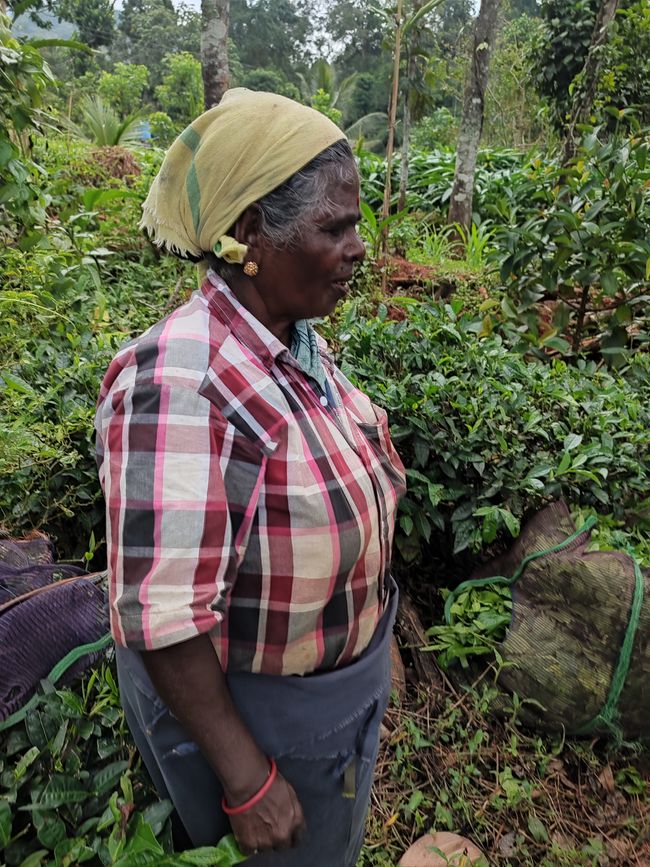
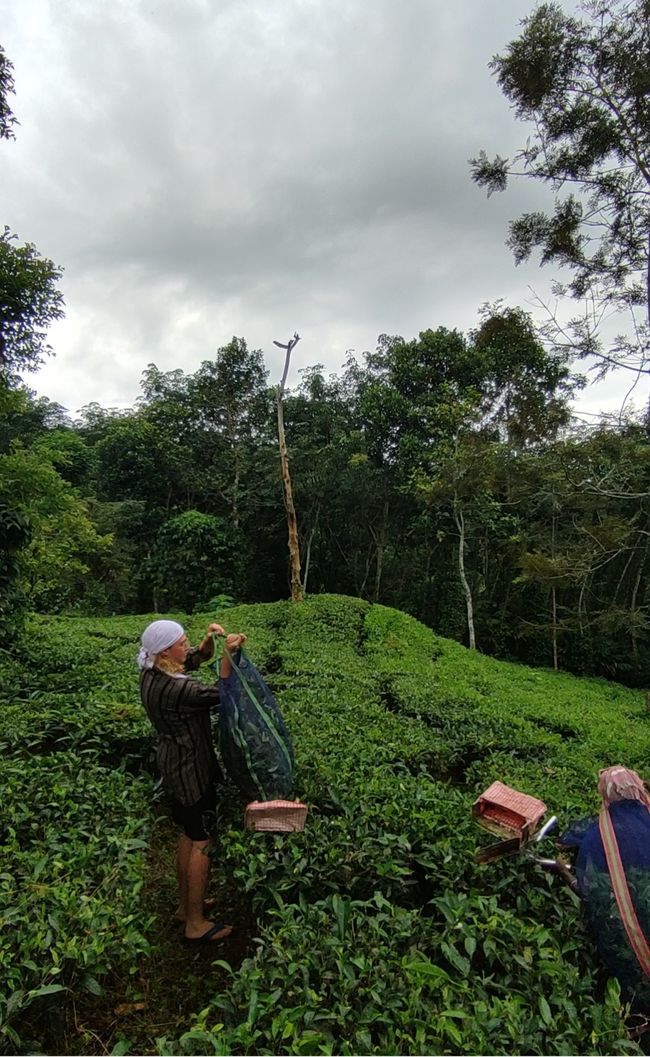
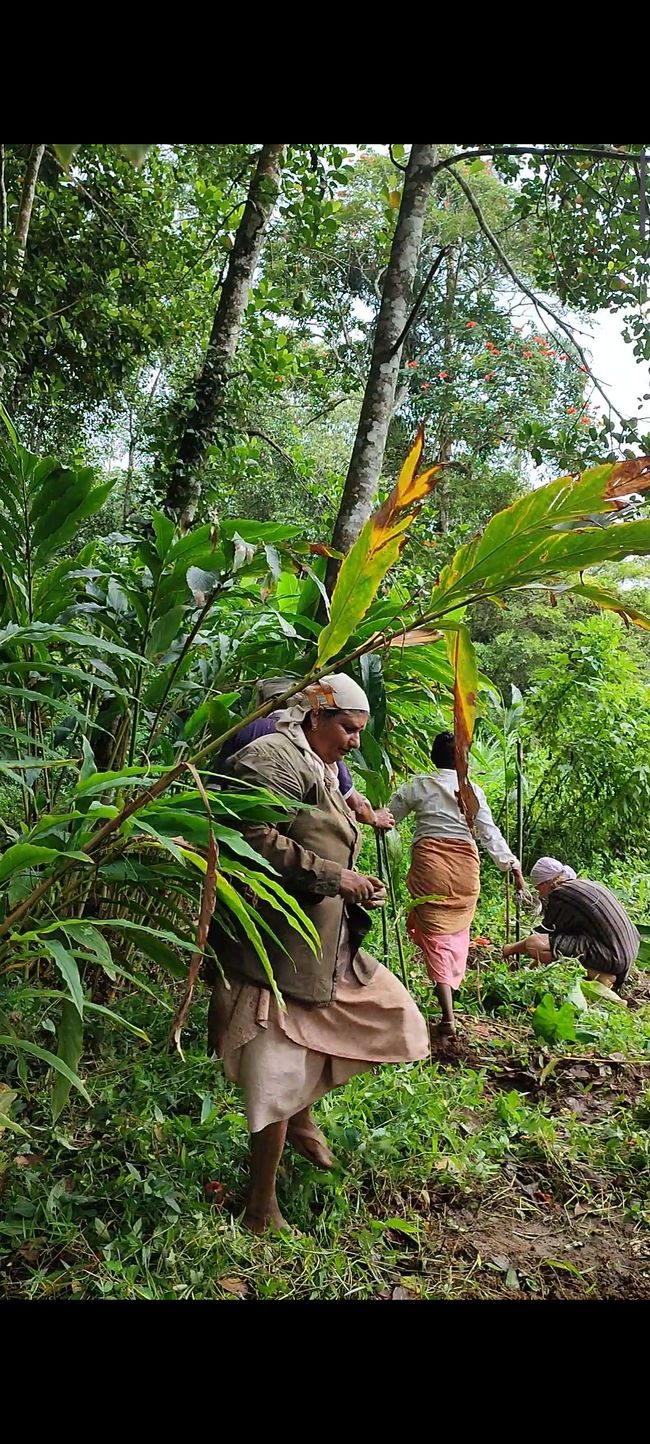
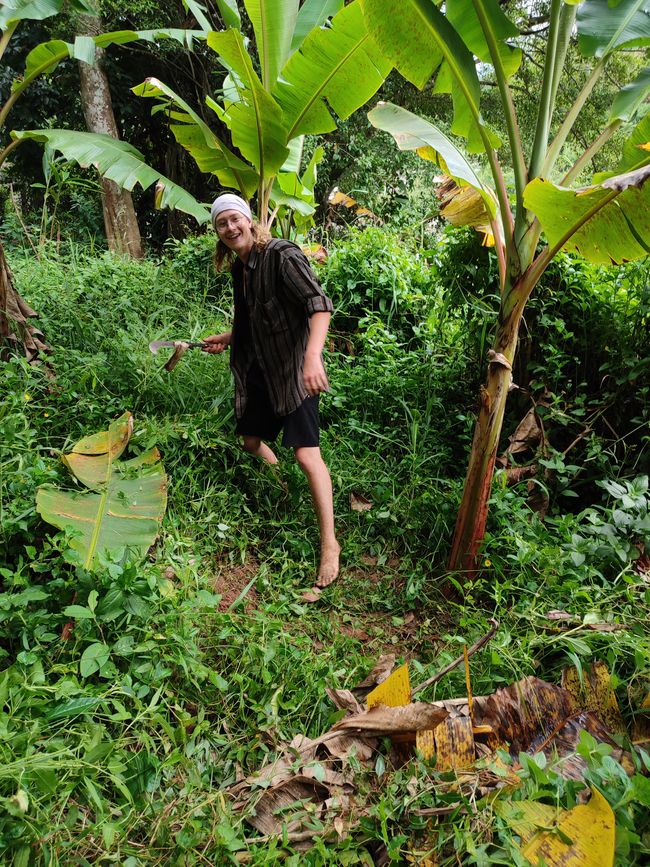
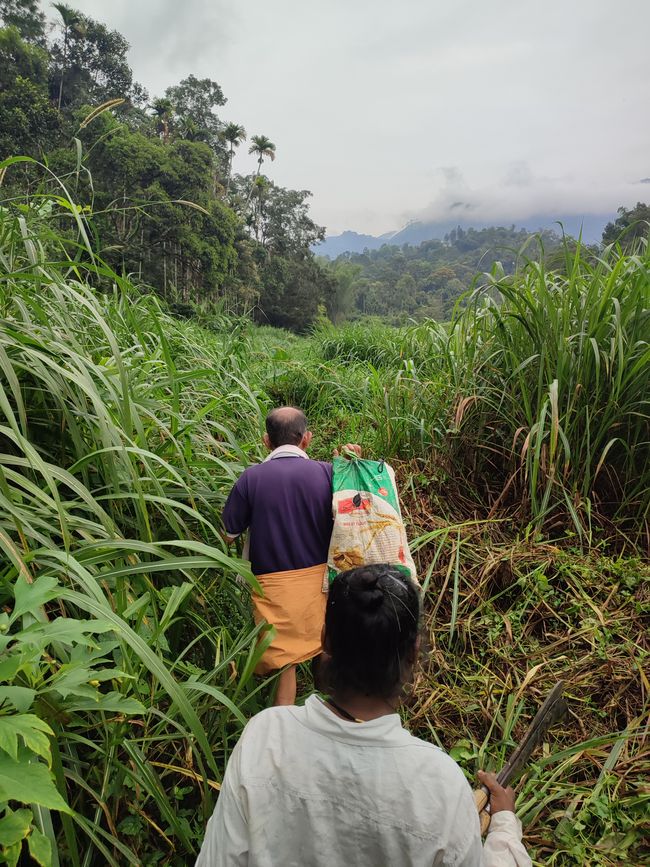
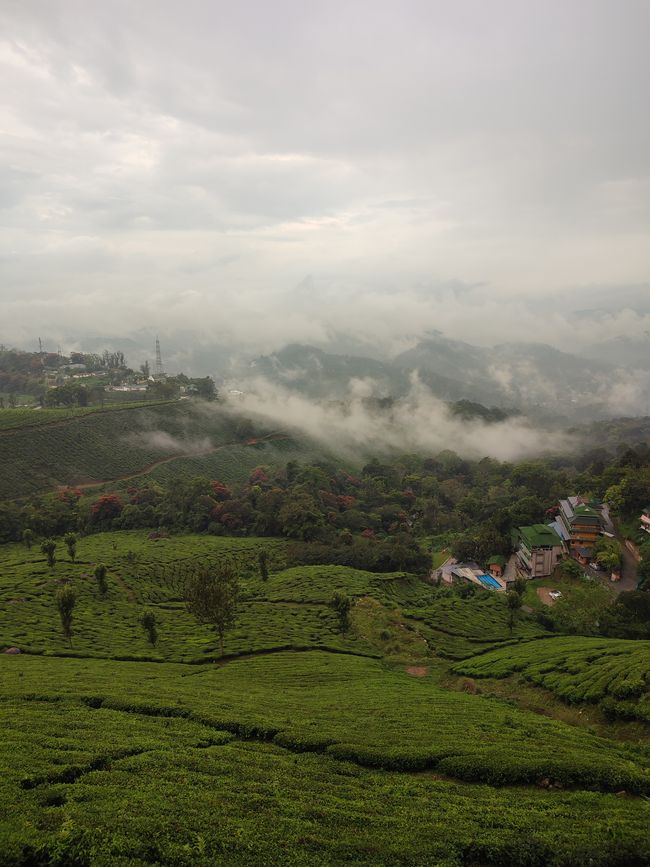
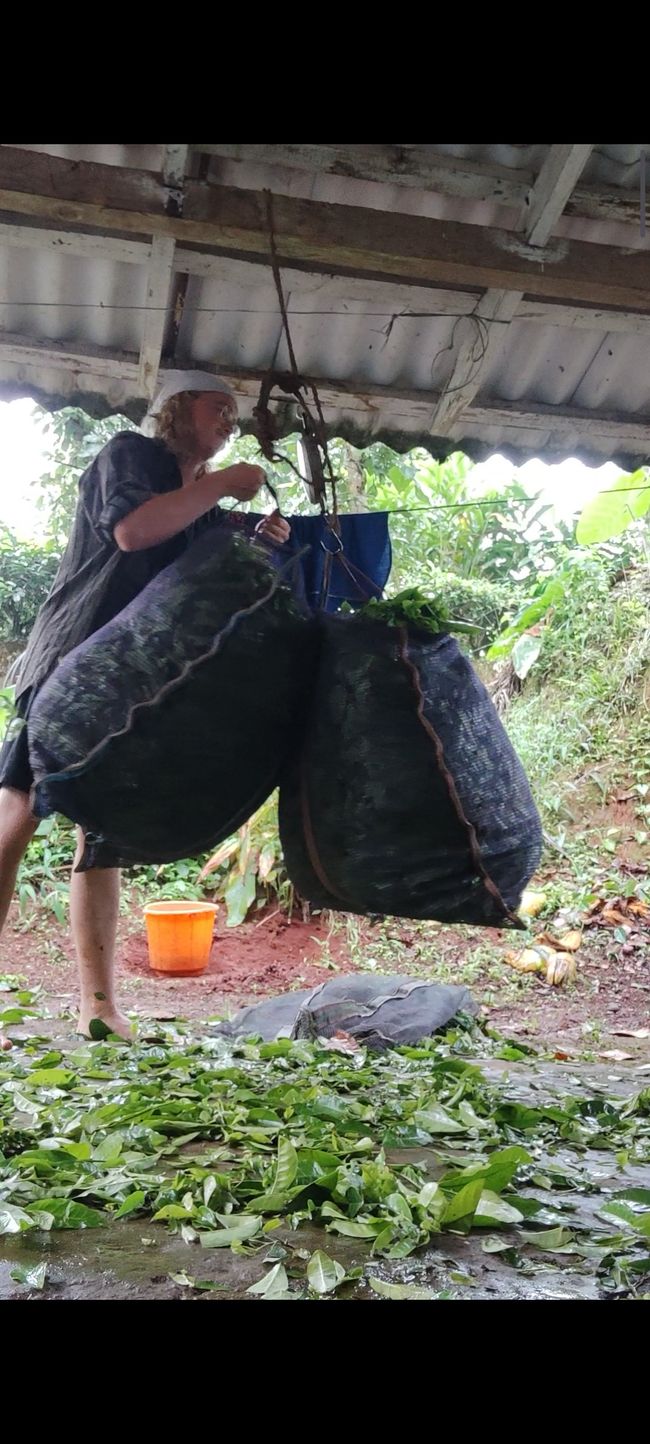
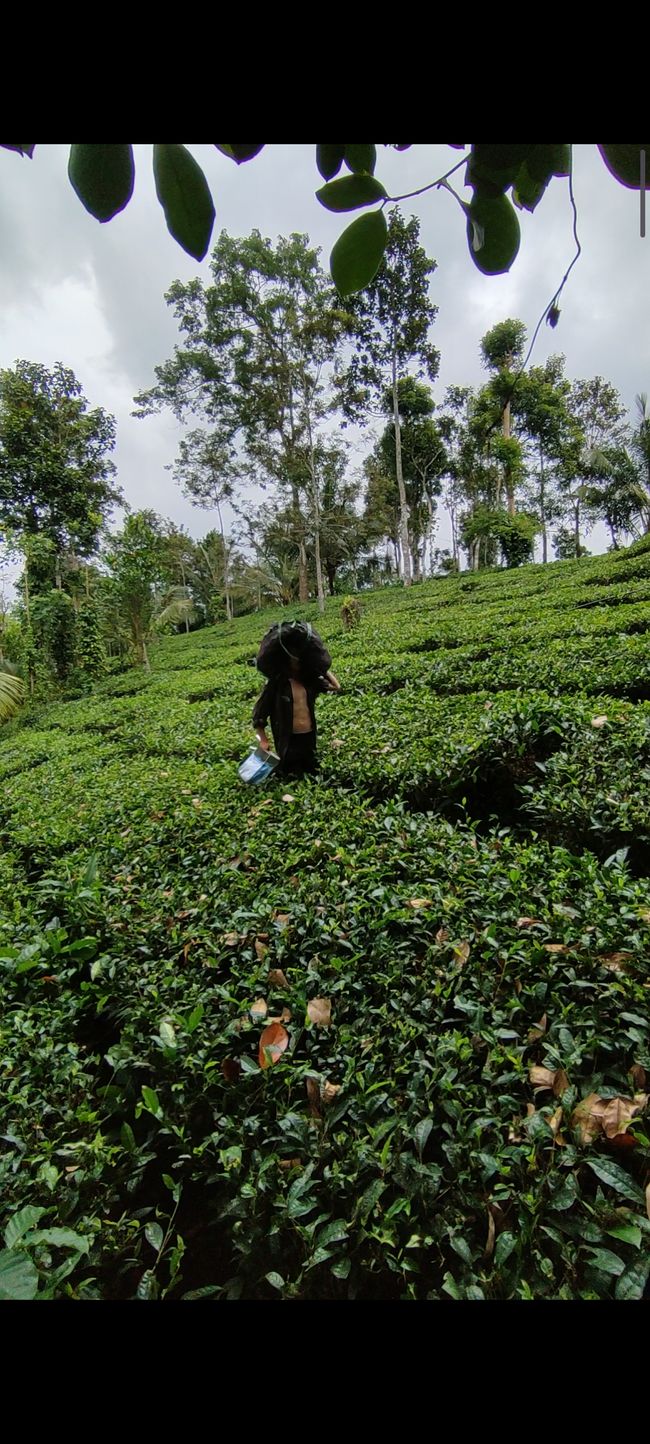
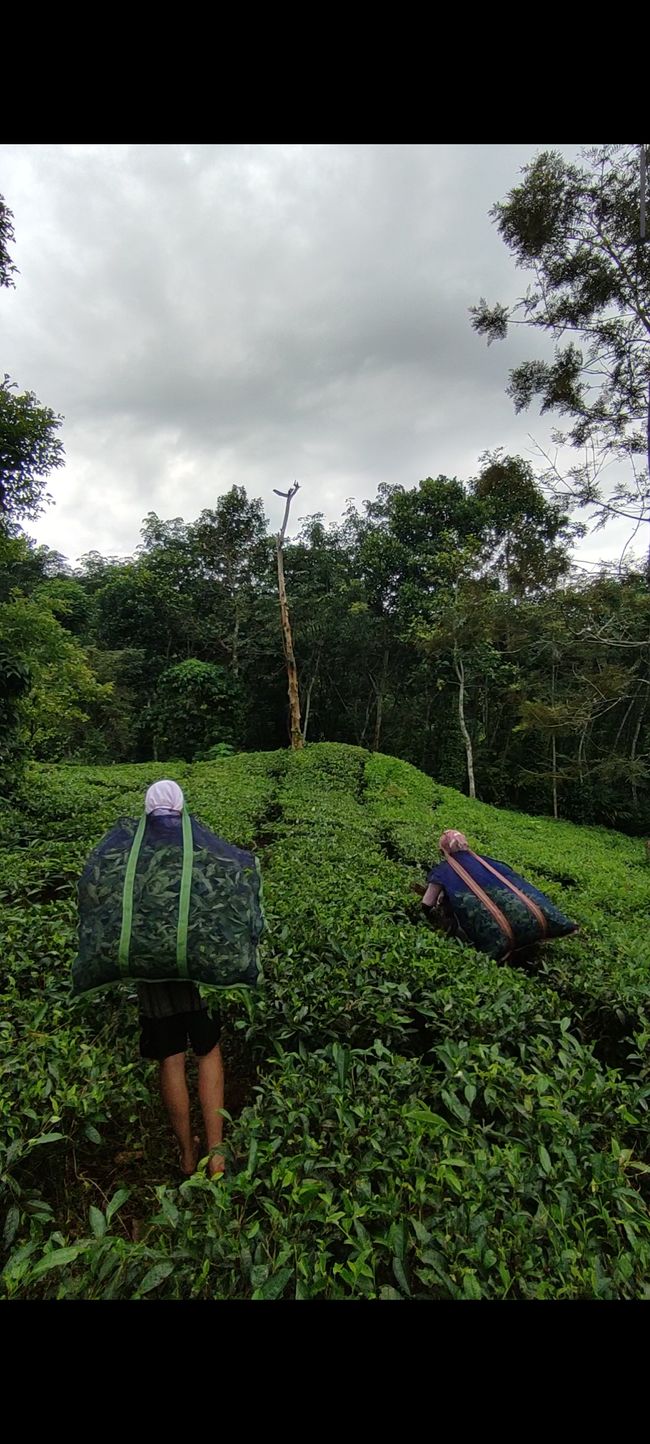
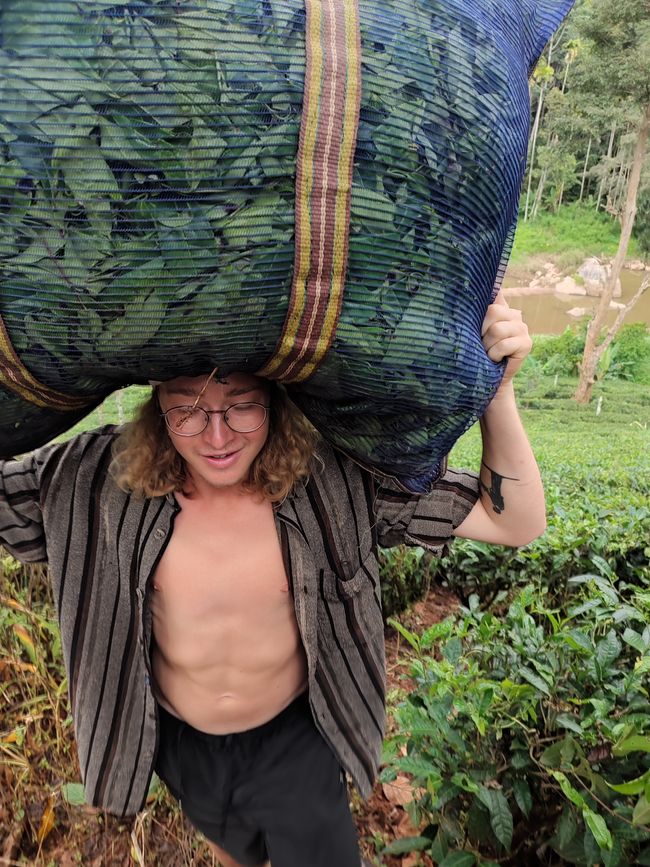
Ejesuscribi Boletín de Noticias-pe
After a far too long bus ride, I arrived in the most famous tea region of India and all the exhaustion of the journey seemed to disappear with the sight of the mist-filled tea fields on every mountain ridge you could see. You felt like you were in a story from the Vedas, in which Hindu samans make a pilgrimage to an enlightened Brahmin who has settled here. A place that shines with peace, culture and a profound wisdom that cannot be proven.
In the hostel I met the Indian woman Shubhangi and Cori again. We greeted each other with lots of hugs and laughter and told each other what we had experienced since we said goodbye. We spent the evening with long conversations, playing amateur billiards and a few more attempts at salsa dancing. She really enjoyed her time with Shubhangi and so we sat on a platonic level, lightly hugging on the balcony, looking at the flickering lights of the distant settlements through the mist and talking about her upcoming arranged marriage and her concerns. When we said goodbye, she gave me a postcard with incredibly kind words.
The next morning it was time to head to the tea plantations! So it was with great anticipation that I went to the house, which was given to me as the meeting point, when it became clear upon arrival that I would be staying overnight with the owner of the plantations for the next few days. I actually imagined staying with one of the workers and not with the wealthy owner who drove an Audi. Nevertheless, he was super nice and made this experience possible for me. He drove 35 minutes with me to the plantation and arranged one or two things there. Then, feeling slightly nervous, I went to a 60-year-old Indian woman who called me over with her broad grin and her clothes marked by dirt stains. There were five other 60 - 75 year old women standing next to her and I quickly noticed that the woman who welcomed me was the one with the largest vocabulary, with around 10 words of English, and I became happier and happier. It became clear to me that from now on for three days all communication would take place with gestures, facial expressions and sounds and that it could be exactly the experience I wanted to have. I immediately felt comfortable with the grinning ladies who were constantly talking and laughing about me in Tamil. The lady who greeted me explained to me how to work here and what to do. I quickly realized that the work was anything but rocket science and had the feeling that after half a day I could carry out all the necessary work steps independently. The big difference, however, was the quantity of work. As I made my way through the tea trees like a clumsy turtle, the women darted through the bushes at a speed that made me think they must be somehow related to Usain Bolt.
So you walk between the tea trees all day long and pick or cut the fresh tea leaves and collect them until the end of the day. A woman gave me a towel, which I followed her and tied around my head to at least have some protection from the sun. When I hung the bag of tea leaves around my head while I picked the leaves, I felt as authentic as possible. Before I started there, I imagined that I would have valuable enlightenment and pick up some wisdom while doing work that was as cognitively demanding as interviews with Trump or Kayne West.
Puppy cake!
(At least I thought so for now)
My head wasn't able to think because it was constantly busy telling my feet where to step so I wouldn't fall. And when I had solid ground under my feet, I asked myself whether the sun, which cast its inexhaustible heat down on me like a burning fireball at its zenith, was trying to punish me for something. When every time at the same time, around 12 o'clock, the sight of the sun was spared by the clouds I had been longing for, a joy arose that lasted as long as the weather in India changed. In the afternoon it would mercilessly pour down all the water that had evaporated in the morning. On the now muddy clay soil on the slope, my flip-flops (like everyone else was wearing) no longer had any grip and I switched to barefoot so as not to look like a drunk who broke into an ice skating rink at night. Now my thoughts turned to the next meal, the question of when I would grow fins in the wet, how I could scratch my feet and legs most efficiently to soothe the ant bites in the short term and again when I could eat something.
At lunchtime around 10 a.m. there was always a tea break with small snacks and sometimes paratha with curry. The women and I ate the parathas with dirty hands on the ground in the field and when they were finished they poured the rest of the tea onto the plate to mobilize the last bits of food and then poured this broth into their mouths. I followed suit and discovered that it was actually quite tasty. Finally, the workers poured the still hot tea over their food-stained right hands to clean them. Before I could answer the question of how the women could endure the still-steaming tea without third-degree burns, one of them poured the tea over my right fin and a volcano erupted inside. On the outside, I grinned goofily and said “Nandi Nandi” (Thank you in Tamil).
Later one of the ladies pulled a tuber out of the ground and showed it to me. Then she pointed first at the dirty tuber, then at her mouth and then at me. She bit into the tuber that was still completely surrounded by earth and held the other half out to me with a grin. I realized it was fresh ginger and when I saw the clayey bulb and the expectant old woman, I thought to myself that it's okay to be stupid when you're young. So I bit off the other half of the stalk. At first the clay taste dominated, which was then replaced by a spiciness that I didn't think was possible. Tears welled up in my eyes and with a laugh I tried to make it clear to her that I wanted water. Of course she didn't understand a word and joined in with my laughter, which was increasingly drowned out by the sound of my desperate exhalation.
But then I was able to let my thoughts wander on the way to work and back. Even though I was usually tired in the morning and exhausted in the evening, the apparently suppressed thoughts sprouted like germs in the brain that had been fertilized throughout the day and formed buds that sometimes withered and sometimes became magnificent flowers.
When, in order to keep myself from throwing up, I finally declared "Pride and Prejudice" by Jane Austin to be hopeless halfway through, I picked up Herman Hesse's "Siddhartha", which my brother warmly recommended to me and was also in India plays. It is about the Brahmin Siddhartha, who, like many other Hindu pilgrims, is looking for salvation from samsara and strives for perfection. However, he does not achieve it through teachings of believers, asceticism or hedonism, but through the pure acceptance and appreciation of all existence on earth.
If there is one goal that all people collectively and individually try to achieve, then it is happiness!? Some people look for it directly, others try to get closer to it little by little without even knowing it. With every action you try to avoid your own suffering and increase your happiness, or is there such a thing as altruism? For some, money, a car or a house brings satisfaction, for others it brings confirmation, knowledge or power, for others it brings family and friends, love and humility. You could now list thousands of motivations from which people derive happiness. Yet it seems as if none of these paths ever led to complete bliss, and out of the fear of this realization, prophets created people and gods who would guide you there if you would just surrender to them and dance by their rules. An excellent way to exercise power. Whether it is the penance of Christians, the meditation of Buddhists, the asceticism of Hindus, the fasting of Muslims or the hedonism of sardists, who can claim to have achieved this bliss? For a long time I thought that the path of hedonism, i.e. the pure maximization of joy and pleasure and the minimization of suffering, no matter by what means, was the best way to achieve this state.
But no matter how hard you try to minimize suffering, you will never be able to eliminate it. As well as? I had already shared the idea before, but it was from this that the flower grew for me, and I don't try to find out whether I think it is fruitful or not. Only through the pure existence of suffering does the state of non-suffering, indifference, exist. And if there is a negative side, there is always a positive side and just as much suffering causes pleasure and joy. It's clear that everyone tries to minimize their suffering, it's only natural. But the existence of this suffering is also natural. So shouldn't you perhaps try to recognize and accept this suffering as such? Shouldn't we just take a look at reality and accept that something like happiness does not exist and can never exist in the battle that has been going on for thousands of years and is supposed to end in the utopian demise of suffering. You could use all the energy and time you previously invested in this search not to strive for a perfect future but to enjoy yourself as best as possible in the here and now. Like Siddhartha, accepting the world and people with all their parts as they are and appreciating their uniqueness.
In short, I really liked the book and its morals and I'll see if this plant with its many flowers takes root in me.
On the third and final day, I brought everyone fried bananas as a thank you and also tried to give them money, which the women in life refused to accept. My surefootedness became better and I accepted the different faces of the weather and so I suddenly needed some kind of cognitive activity. I reached for my guilty pleasure go-to: medical podcasts. However, since I know that when I come back to Germany and start my studies, I want to dedicate myself to medicine like the strict Muslims promise the believers the devotion of the virgins in paradise, I would like to use the time of the trip to immerse myself in other and more suitable subject areas. So I started with the detailed geography of the earth and am currently studying history, while the topic of culture keeps coming back and many other areas await me.
So while I was picking my tea leaves in my ears with a lecture about the treatment of coronary heart disease according to current guidelines and the diagnostic assessment of appropriate ECG findings, the next thought came to me. One I already knew I would have, just not when. The appreciation of our German privilege. That I have the freedom, be it socially, financially, physically and mentally, to be able to have an experience like this. That I can educate myself at home as I please, that as a 21-year-old I can afford to travel for a year with the money I've earned, that I'm allowed to love whoever I want and my family, even if I'm there for one selfish year and don't always follow her advice, loves. And yet I immediately noticed that I could learn so much from the women who have been doing this work 356 days a year for 50 years and have never had access to education or free development. Be it patience, humility, making the most of what you have, living more closely with nature and understanding it better, or no matter how hard the sun tries to set you on fire, the rain makes you slip on the mud and the ants and mosquitoes try to bite you, there is always a reason to smile. Because we are lucky enough to get on the spectacular roller coaster ride of life and experience all of its ups and downs and that is something incredibly special.
I spent the evenings freeing myself from the dirt that had settled in the deepest pores of my skin throughout the day, recovering, doing yoga and talking on the phone to family and friends. I will never be able to understand how I spent 30 minutes cleaning my pants and shirt with soap and a hand wash that any washing machine with a spin cycle could only dream of, but still came out with a cloudy brown liquid that looked exactly like it smelled. On the second evening I spent two hours on the phone with Lara, a, yes... I don't know exactly how we relate to each other... a very, very good friend. I literally noticed how her words and stories and her questions and her open ear recharged my energy and I fell asleep with butterflies in my stomach.
On the last evening I spontaneously planned to go on a sunrise tour on a mountain with others the next morning, which was organized by the hostel where I spent my first night and planned to spend tomorrow there as well. I noticed the rudeness of the staff on the first night and so I went to the hostel with moderate joy to ask if I could take part in the morning, even if I didn't check in until the afternoon. He told me emotionlessly and disinterestedly that he could tell me at 9 a.m. because at least six people had to register. I thanked him and went to the common room to wait, listened to Bob Marley's "Best of" album and solved a few crossword puzzles when the same unsympathetic Heini comes to me and tells me I'm not allowed to be here because I'm not a guest . I told him again that I had stayed here two days ago, that I would check in again tomorrow and that I was waiting for his response as to whether I could dance in front of his hostel at 3 a.m. so that I could give him the 1000 rupees he had paid for. He didn't seem to care in the slightest, and even the rain outside didn't change his emotional coldness. Annoyed, I went back to my accommodation and waited for his call. At half past ten, when he still hadn't answered, I called him. He forgot to call me and tell me that I wasn't allowed to take part. "Asshole" I said to myself, hung up and canceled the overnight stay with this idiot. Afterwards I cried a lot, out of an impulsive and unfounded fear that I would have a different relationship with my best friend when I got back. OK, it's not unfounded. Of course we will have a different relationship, but that is normal after a year of development on both sides. Rather, it is the longing for the fantastic past with Malte and Eva.
So I set off for Goa a day earlier than planned and have been sitting in this overcrowded train that smells of excrement for 10 hours, in which I'm sweating like an animal and just like the biriyani that comes through the windows is sold, eat and drink a Chai Massala. When changing trains I met a rarity, a Caucasian backpacker. She spoke to me with a smile and after a few sentences I thought I heard a hint of German accent in her actually very good English. We then laughed and chatted for ten minutes, she asked about my Instagram and, as always, she said "maybe we'll see each other again in city XY (here Hampi)". I happily looked for my connection with the thought of the open, nice, laughing and good-looking backpacker who I will certainly never see again, "it's a shame," I think to myself. I still have another 8 hours ahead of me and have been writing this block entry for almost 4 hours now. While I was on the phone with my father yesterday, he pointed out the numerous spelling and grammatical errors in my blog entries. I'm sorry Dad, but I'm just a hippinomad who is putting all bourgeois and civilized standards aside for the coming year. At this time, authenticity and writing down my thoughts without thinking too much about them are more important to me. Please accept these statements with a big wink ;)
Ejesuscribi Boletín de Noticias-pe
Mbohovái
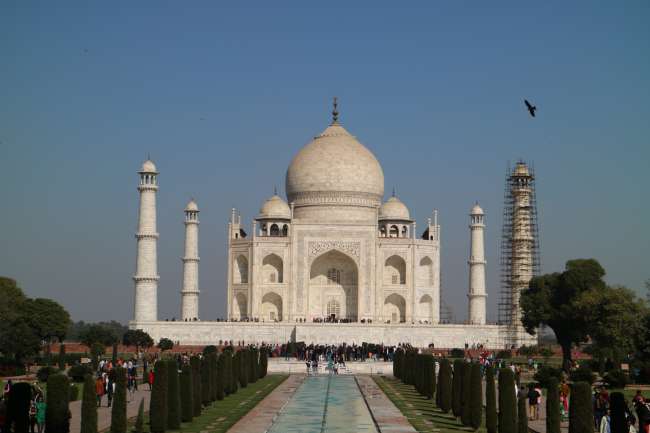
Marandu jeguata rehegua India

